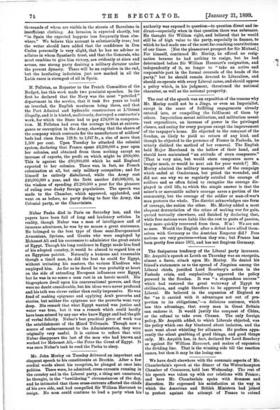Nubar Pasha died in Paris on Saturday last, and the
papers have been full of long and laudatory articles. In reality, though Nnbar was a man of intelligence and of immense adroitness, he was by no means a great statesman. He belonged to the best type of those semi-Europeanised Armenians, Syrians, and Greeks who were employed by Mehemet Ali and his successors to administer the great estate of Egypt. Though his long residence in Egypt made him fond of his adopted country, it would be absurd to regard him as an Egyptian patriot. Naturally a humane and reasonable though a timid man, he did the best he could for Egypt, without irritating his masters, the various Khedives who employed him. As far as he dared he was probably at heart on the aide of extending European influences over Egypt, but he was in no sense a man cast in an heroic mould. His biographers dwell upon his conversational powers, and they were no doubt considerable, but his ideas were never profound and his talk was clever rather than really impressive. He was fond of making epigrams and applying Arab proverbs and stories, but neither the epigrams nor the proverbs went very deep. The remark that what Egypt wanted was justice and water was true, but it was a remark which could hardly have been missed by any one who knew Egypt and had the gift of verbal felicity. Nubar's best practical piece of work was the establishment of the Mixed Tribunals. Though now a source of embarrassment to the Administration, they were originally very useful. It is curious to reflect that with Nailer disappears the last of the men who had known and worked for Mehemet Ali,—the Peter the Great of Egypt. It was once Nubar's task to read the Pasha to sleep.


































 Previous page
Previous page